**Why Does My Car AC Smell Like Gas? Understanding the Causes and Solutions**
If you’ve noticed a strong gas-like odor emanating from your car’s air conditioning system, you’re not alone. This unpleasant smell can be concerning, and it’s important to understand its causes to ensure your vehicle remains safe and comfortable. Here’s what you need to know about why your car AC might smell like gas and what steps you can take to resolve the issue.

### Common Causes of a Gas Smell from Your Car AC
1. **Gasoline Vapor Leaks**

– **Source:** A leak in the fuel system, such as the fuel injectors, fuel lines, or fuel tank, can cause gasoline vapors to escape. These vapors may travel into the cabin via the ventilation system, creating a noticeable gas smell.
– **Symptoms:** Besides the smell, you might notice a drop in fuel efficiency or engine performance issues.

2. **AC System Contamination**
– **Source:** Sometimes, residual fuel vapors can enter the air conditioning system if there’s a leak or if the vehicle’s ventilation system is drawing in outside air contaminated with fuel fumes.

– **Symptoms:** The smell tends to intensify when the AC is turned on and may persist even after turning off the system.
3. **Evaporator or Cabin Air Filter Issues**
– **Source:** A dirty or moldy cabin air filter or evaporator coil can harbor bacteria or mold, which may produce foul odors that resemble gasoline.
– **Symptoms:** The smell often worsens when the AC runs and may be accompanied by musty odors.
4. **Fuel System or Engine Oil Leaks**
– **Source:** Leaking engine oil or fuel leaks can produce fumes that are drawn into the cabin, especially if the vehicle’s ventilation system is pulling in outside air.
– **Symptoms:** Other signs include oil spots under the vehicle or engine warning lights.
### Why Is This a Concern?
A gas smell in your vehicle isn’t just unpleasant—it can indicate a potentially serious safety issue. Gasoline vapors are highly flammable and can pose fire hazards if there’s a leak. Moreover, inhaling fuel fumes over time can be harmful to your health.
### What Should You Do?
1. **Inspect for Fuel Leaks**
– Check under your vehicle for visible signs of fuel leaks or wet spots around the fuel tank and fuel lines.
– If you suspect a leak, **do not drive** the vehicle and seek professional repair immediately.
2. **Schedule a Professional Inspection**
– Have a qualified mechanic inspect your fuel system, fuel lines, and connections for leaks.
– Request an assessment of your AC system, including the evaporator and cabin air filter.
3. **Replace or Clean Cabin Air Filters**
– A dirty filter can trap odors and mold. Replacing the filter can often eliminate musty or fuel-like smells.
4. **Check for Engine Oil or Other Fluid Leaks**
– Address any leaks promptly to prevent fumes from entering the cabin.
5. **Use the Recirculation Mode**
– When running the AC, switch to recirculation mode to minimize outside air intake, reducing the chances of drawing in fuel fumes.
6. **Ventilate Your Vehicle**
– Regularly airing out your vehicle can help disperse lingering fumes.
### Final Thoughts
A gas smell coming from your car’s AC system should never be ignored. It can indicate leaks or other issues that pose safety risks. The best course of action is to have your vehicle inspected by a professional technician promptly. Addressing the root cause not only restores comfort but also ensures your safety and the longevity of your vehicle.
If you experience persistent odors or suspect a fuel leak, do not delay—your safety is paramount.

